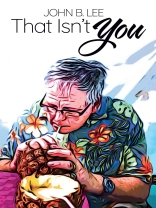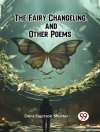The title for That Isn’t You is inspired by a comment made by my mother concerning a video transcribed from an old eight-millimeter film. In a still shot, isolated from a single frame of the moving picture, I am riding high on my uncle John’s shoulders. When Mother saw the photograph she said ‚that isn’t you, ‚ meaning she could not imagine a day from the past when I would have had that kind of relationship with my father’s elder brother, the bachelor farmer who lived in our house.
In the photograph I am obviously delighted and thrilled and full with the joy of riding high on my six-foot-two uncle’s shoulders. So, her phrase got me to thinking about ‚identity‘ and how we see ourselves, how we are seen by others who might claim to know us well, how we are seen by friends and familiars, how we are seen by strangers, both in chance meetings, and in brief encounters, how we are seen after we pass away when the living refuse to acknowledge what I call ‚the full grumble of the dear departed.‘ The true self, the persona, the disconnection between the masks we so often wear to show the world what we wish to reveal, and the face behind the mask. As an aging man I sometimes feel I shave a stranger every morning. I catch a glimpse of my own reflection and wonder, ‚Who are you?‘ I was once startled beyond words by being greeted at a family picnic by a seldom-seen relative, ‚So, how is my sexy cousin doing?‘ Surely, she could not mean yours truly. It was quite embarrassing because I think she thought I saw myself that way, when it could never be further from the truth.
Inhaltsverzeichnis
– That Isn’t You – p.ix
– … in a garden of broken cars – p.5
– Why are you here … – p.7
– The Knowing Tree – p.9
– When I Was a Boy Before Watches – p.11
– The Halcyon Days – p.12
– Lying in Bed and Wondering – p.13
– One Morning after the Kill – p.15
– Naming the Cats – p.17
– I Used to Weed My Mother’s Garden After the Rain in Despair – p.19
– In a Garden of Broken Cars – p.21
– In Different Houses – p.23
– Cruel, oh cruel − what lesson did I learn – p.25
– on the hilltop at the end of day … – p.27
– Tip – p.29
– Awakening – p.31
– As the Children Begin to Sing – p.32
– Gender Wars of the 1950s – p.34
– Canada Day – p.35
– The Careful Mind – p.37
– Oh How I Long to Be Grateful and True – p.39
– The Summer at the End of Childhood – p.41
– Lost in the Language – p.43
– Contemplating Photographs of Childhood – p.45
– Adolescentulae at first communion – p.47
– Suddenly Coming of Age – p.48
– First Heat – p.49
– Down There – p.50
– Girlie Pictures – p.51
– Acedia – p.53
– Smoking a Pipe like a Poet: was I ever that young – p.55
– Whispering Home – p.61
– What Memory Forgets – p.63
– Since Last You Looked – p.64
– Milkweed Girdles – p.65
– For My Grandfather – p.66
– When I Can’t See You and You Can’t See Me – p.68
– Going Back – p.69
– As Well as Well – p.71
– Making More – p.73
– Make Do – p.74
– Little Did I Know – p.76
– How Do You Deal with Things That Cannot Be Helped – p.78
– An Elegy for the Barns at Leeland Farm – p.79
– As it Turns Out – p.81
– Last Hurrah – p.82
– At Night When Raccoons Come for the
Corn Like the Knowledge of Eve – p.84
– What is it the Spirit Sees When the Body that Holds it isn’t There – p.86
– The Thousand Tears – p.89
– Ode on Homemade Wine at Christmas – p.91
– The Physics of Memory, the Mechanics of Dream – p.92
– What Holds Us When We’re Gone – p.93
– Vinegar on the lips of the Lord – p.95
– What Can You See When It’s Gone – p.97
– Renovation – p.99
– The Conversation – p.100
– Bereft – p.103
– Afterword: Richard (Tai) Grove – p.104
– Author Bio – p.105












